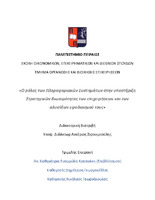Ο ρόλος των πληροφοριακών συστημάτων στην υποστήριξη στρατηγικών βιωσιμότητας των επιχειρήσεων και των αλυσίδων εφοδιασμού τους

Προβολή/
Λέξεις κλειδιά
Βιώσιμη ανάπτυξη ; Πληροφοριακά συστήματα ; Πληροφοριακή τεχνολογία ; Ψηφιακός μετασχηματισμός ; Διαχείριση εφοδιαστικής αλυσίδας ; Βιώσιμη αλυσίδα εφοδιασμού ; Βιώσιμες στρατηγικές ; Επιχειρηματική επίδοσηΠερίληψη
Στη σημερινή εποχή που οι περιβαλλοντικές, οικονομικές και κοινωνικές πιέσεις προς τις επιχειρήσεις αυξάνονται διαρκώς, η ανάπτυξη βιώσιμων αλυσίδων εφοδιασμού είναι απαραίτητη για την αποτελεσματική λειτουργία και επιβίωση των εταιρειών, που συμμετέχουν και αλληλοεπιδρούν στις αλυσίδες αυτές. Ο ψηφιακός μετασχηματισμός των αλυσίδων εφοδιασμού και η υιοθέτηση πληροφοριακών συστημάτων ή νέων τεχνολογιών, στο πλαίσιο της 4ης βιομηχανικής επανάστασης, θα μπορούσαν να υποστηρίξουν την ανάπτυξη βιώσιμων πρακτικών, καθώς μπορούν να υποστηρίξουν και να βελτιώσουν τις διάφορες διαδικασίες της εφοδιαστικής αλυσίδας. Επίσης, θα μπορούσαν να συμβάλουν στη μείωση του λειτουργικού κόστους και στην ενίσχυση της δυνατότητας ελέγχου και παρακολούθησης των επιχειρηματικών λειτουργιών. Τέλος, θα μπορούσαν να υποστηρίξουν τις πράσινες πρακτικές των εταιρειών.
Σκοπός της παρούσας διδακτορικής διατριβής είναι να διερευνήσει τη σχέση μεταξύ των βιώσιμων εφοδιαστικών αλυσίδων και του ψηφιακού μετασχηματισμού, μέσω της υιοθέτησης πληροφοριακών συστημάτων ή νέων τεχνολογιών, όπως «τεχνολογία Blockchain», «Big Data Analytics» και «Internet of Things». Επίσης, βασικός στόχος της είναι η χρήση κατάλληλων θεωριών και η ανάπτυξη ενός εννοιολογικού πλαισίου, το οποίο να διευκρινίζει υπό ποιες συνθήκες θα μπορούσε ο παραπάνω συνδυασμός να οδηγήσει στην αύξηση της επιχειρηματικής επίδοσης, αλλά και στην ανάπτυξη συγκεκριμένων βιώσιμων στρατηγικών.
Για να επιτευχθούν τα παραπάνω, πραγματοποιήθηκε αρχικά εκτενής ανάλυση της βιβλιογραφίας, όπου εντοπίστηκαν σημαντικά ερευνητικά κενά. Σύμφωνα με τη βιβλιογραφική έρευνα που πραγματοποιήθηκε, υπάρχουν λίγες μελέτες διεθνώς, οι οποίες διερευνούν σε βάθος και τους τρεις πυλώνες της βιωσιμότητας στις εφοδιαστικές αλυσίδες, ενώ ταυτόχρονα αναλύουν τον αντίκτυπο των πληροφοριακών συστημάτων ή των νέων τεχνολογιών.
Προκειμένου να καλυφθεί το συγκεκριμένο ερευνητικό κενό, η παρούσα διδακτορική διατριβή εστίασε αρχικά στον προσδιορισμό ορισμών και θεωριών που συνεισφέρουν στην ανάλυση των τριών πυλώνων της βιωσιμότητας, εξετάζοντας ταυτόχρονα την επίδραση διαφορετικών πληροφοριακών τεχνολογιών. Στη συνέχεια, ανέπτυξε ένα θεωρητικό εννοιολογικό πλαίσιο, το οποίο αποτέλεσε τον βασικό κορμό πάνω στον οποίο στηρίχθηκε η εμπειρική έρευνα και η ανάλυση των δεδομένων.
Η μεθοδολογία έρευνας που ακολουθήθηκε σε αυτή τη διατριβή είναι μεικτή, περιλαμβάνοντας συνδυασμό ποσοτικής και ποιοτικής έρευνας. Η ποσοτική έρευνα διενεργήθηκε μέσω της ανάπτυξης ερωτηματολογίου και της αποστολής του σε εταιρείες 3PL. Τα αποτελέσματα της έρευνας οδήγησαν στην επαλήθευση συγκεκριμένων υποθέσεων και στη διεξαγωγή συμπερασμάτων που διερευνήθηκαν περαιτέρω μέσω της ποιοτικής έρευνας. Η ποιοτική έρευνα βασίστηκε στον σχεδιασμό και στην ανάλυση τριών μελετών περίπτωσης που οδήγησαν στην κατανόηση σε βάθος των επιστημονικών ερωτημάτων που είχαν τεθεί.
Τα κύρια ευρήματα αυτής της διατριβής υποστηρίζουν ότι ο ψηφιακός μετασχηματισμός παίζει σημαντικό ρόλο για τις εταιρείες, καθώς ο συνδυασμός διαφορετικών τεχνολογιών με τους επιχειρηματικούς πόρους μπορεί να οδηγήσει στην ανάπτυξη σημαντικών δυνατοτήτων των εφοδιαστικών αλυσίδων, που αυξάνουν τον βιώσιμο αντίκτυπο και την επιχειρηματική επίδοση των εταιρειών. Τα αποτελέσματα αυτά μπορούν επιπλέον να οδηγήσουν σε περαιτέρω ανάπτυξη των στρατηγικών βιωσιμότητας των επιχειρήσεων.

